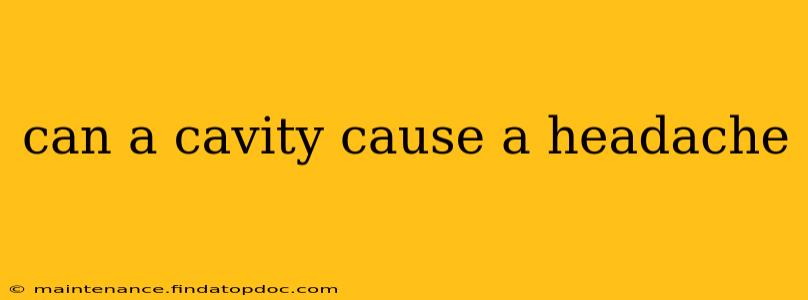A throbbing toothache is miserable enough, but the question many sufferers ask is: can a cavity cause a headache? The short answer is yes, though it's not a direct, immediate cause in most cases. The connection is more intricate and involves the intricate network of nerves and tissues in your head and face.
Let's delve into the specifics and explore the reasons why a cavity can lead to headaches, along with other related issues.
How Can a Cavity Lead to a Headache?
The pain from a cavity doesn't directly travel to your head to cause a headache. Instead, the intense pain of a significant cavity or tooth infection triggers the nervous system, which can lead to referred pain. This means the pain originates in your tooth but is felt in another area—in this case, your head.
Several factors contribute to this referred pain:
-
Inflammation and Infection: Untreated cavities can become infected, causing inflammation of the tooth's pulp (the soft tissue containing nerves and blood vessels). This inflammation can put pressure on surrounding nerves, potentially leading to headache pain.
-
Nerve Sensitivity: Nerves in your teeth are closely connected to the trigeminal nerve, a major cranial nerve that branches out to your face, jaw, and even your temples. Irritation or infection in a tooth can activate these nerves and trigger pain felt not just in the tooth, but also radiating to the head as a headache.
-
Sinus Pressure: Upper teeth are closely located to the sinuses. A severe infection from a cavity could spread and cause inflammation of the sinus cavities. This sinusitis can produce pressure that mimics or exacerbates a headache.
What Kind of Headache Does a Cavity Cause?
The type of headache associated with a cavity isn't a typical tension headache or migraine. Instead, it's often described as:
- A sharp, localized pain: The pain may originate in the tooth and radiate outwards to the jaw, temple, or even the eye on the same side of the face.
- A throbbing or pulsating pain: This is especially common with infection.
- Pain that intensifies with pressure: Biting down or chewing might worsen the pain.
- Pain that's often accompanied by other symptoms: These may include swelling of the gums, a fever, or sensitivity to hot or cold temperatures.
Can a Filling Cause a Headache?
While less common than a cavity itself, a poorly placed filling or a filling that’s cracked or damaged can also cause pain and potentially trigger a headache. This is because it can irritate the underlying tooth structure and nerves.
What to Do if You Have a Toothache and Headache
If you're experiencing a toothache accompanied by a headache, it's crucial to see a dentist immediately. Don't delay seeking treatment. Delaying treatment can allow the infection to spread, causing further complications and potentially leading to more severe pain. Your dentist can diagnose the problem and provide appropriate treatment, such as a filling, root canal, or extraction, to resolve the underlying tooth issue and alleviate the headache.
Can Other Dental Problems Cause Headaches?
Yes! Several other dental problems can lead to headaches, including:
- Gum disease (periodontitis): Inflammation from gum disease can affect surrounding structures and nerves, contributing to headaches.
- Temporomandibular joint (TMJ) disorders: Problems with the jaw joint can cause pain that radiates to the head.
- Abscesses: A localized infection can put immense pressure on surrounding nerves, leading to severe pain and headaches.
When to Seek Emergency Dental Care?
Seek emergency dental care if you experience:
- Severe, unbearable tooth pain
- Swelling in the face or jaw
- High fever
- Difficulty opening your mouth
Ignoring these symptoms can have serious health implications.
This information is for general knowledge and doesn't replace professional dental advice. If you suspect a dental problem is causing your headache, consult a dentist for diagnosis and treatment. Early intervention can prevent more significant issues and ensure a swift return to good oral and overall health.
